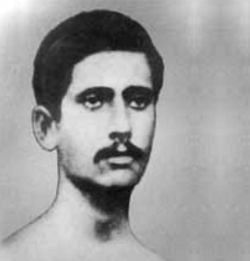Devotional songs of Rajanikanta Sen

The last quarter of the nineteenth century and the first half of the twentieth century saw the meteoric rise of Bengali writers, poets, lyricist and story tellers. This period, known as the golden era of our history, saw the rise of five very notable poets-cum-lyricists and music composers – Rabindranath Tagore, Kazi Nazrul Islam, Atul Prasad Sen, Rajanikanta Sen and Dwijendralal Roy – known as Pancha Kabi. These five poets had the remarkable ability to sing and were capable of setting the tune to their own lyrics.
Rajanikanta is famous for his devotional songs. He was born on this day (July 26) in 1865 in Bhangabari village under Belkuchi Upazila in Sirajgang District. His father was Guruprasad Sen. He was tutored in music by his father from his early childhood. He did his BA and BL from Calcutta City College in 1891. After a sojourn stay at Natore and Naogaon as Munsif, he started to practice law at Rajshahi.
Rajanikanta's songs, known as Kanto Geeti, were a major contribution towards the immortal devotional songs. Some of his popular devotional songs we hear today are: “Tumi Nirmal'o Koro Mongol o Kore”, “Preme Jol Hoe Jao Gole”, “Ami To Tomare Chahini Jibone” and “Keu Nayan Mude Dekhe Alo Keu Dekhe Adhar”. All these songs give a picture of the inherent devotion of the poet to the Almighty. Rajanikanta's lyrics are lucid and simple. One can easily identify with the inner emotion of a person towards his worldly life. In most of his songs he appears seek forgiveness from the Almighty. His songs like “Aami Akriti Aadham Boleo”, “Keno Bonchito Hobo Charane”, “Aha Koto Aparadh Korechi Ami Tomare Charane Mago”, “Ami Sokol Kajer Pai He Somoy”, “Oi Bodhir Jobonika Khulia”, “Tumi Arup Swarup Saguna Nirjana” and “Jagao Pothikere o Se Ghume Acheton”.
One of his songs composed during the swadeshi movement, “Mayer Dewa Mota Kapar”, quickly became popular and was an inspiration for participants in the movement, and later for the Freedom Fighters. Another of his songs with similar intention was “Amra Nehat Gorib, Amra Nehat Chhoto”.
In 1909, Rajanikanta developed throat problems. On September 10 the same year he was forced to move to Calcutta (now Kolkata, India) along with family members despite very stringent financial conditions. He was suffering from larynx cancer. On June 11, 1910 Rabindranath Tagore visited him in Calcutta Medical Hospital. He died on September 13, 1910 at the age of 45.
Bengalis will always remember the devotional songs of Rajanikanta Sen. It's unfortunate that nowadays we hardly ever hear the Kanto Geeti's on our TV or Radio channels.
The writer teaches Environmental Science at Gono Bishwabiddalaya, Savar, Dhaka.

 For all latest news, follow The Daily Star's Google News channel.
For all latest news, follow The Daily Star's Google News channel. 




Comments